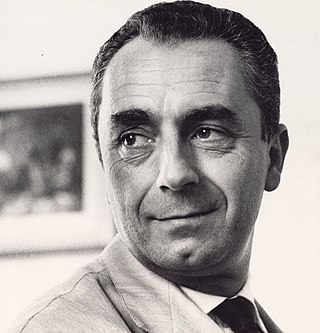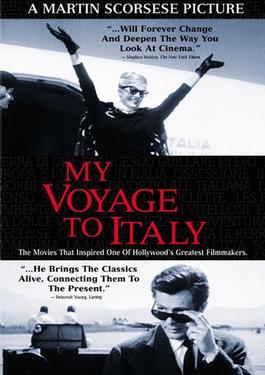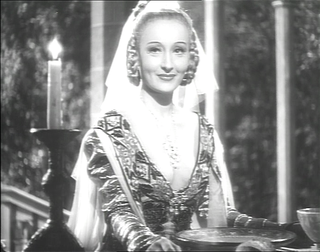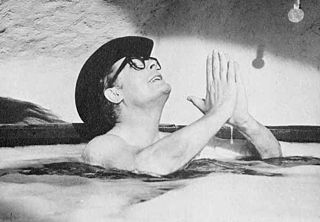Related Research Articles

The cinema of Italy comprises the films made within Italy or by Italian directors. Italy is one of the birthplaces of art cinema and the stylistic aspect of film has been one of the most important factors in the history of Italian film. As of 2018, Italian films have won 14 Academy Awards for Best Foreign Language Film as well as 12 Palmes d'Or, one Academy Award for Best Picture and many Golden Lions and Golden Bears.

Michelangelo Antonioni was an Italian director and filmmaker. He is best known for his "trilogy on modernity and its discontents"—L'Avventura (1960), La Notte (1961), and L'Eclisse (1962)—as well as the English-language film Blowup (1966). His films have been described as "enigmatic and intricate mood pieces" that feature elusive plots, striking visual composition, and a preoccupation with modern landscapes. His work substantially influenced subsequent art cinema. Antonioni received numerous awards and nominations throughout his career, being the only director to have won the Palme d'Or, the Golden Lion, the Golden Bear and the Golden Leopard.

Luchino Visconti di Modrone, Count of Lonate Pozzolo was an Italian filmmaker, theatre and opera director, and screenwriter. He was one of the fathers of cinematic neorealism, but later moved towards luxurious, sweeping epics dealing with themes of beauty, decadence, death, and European history, especially the decay of the nobility and the bourgeoisie. Critic Jonathan Jones wrote that “no one did as much to shape Italian cinema as Luchino Visconti.”

Cesare Zavattini was an Italian screenwriter and one of the first theorists and proponents of the Neorealist movement in Italian cinema.

Italian neorealism, also known as the Golden Age, was a national film movement characterized by stories set amongst the poor and the working class. They are filmed on location, frequently with non-professional actors. They primarily address the difficult economic and moral conditions of post-World War II Italy, representing changes in the Italian psyche and conditions of everyday life, including poverty, oppression, injustice and desperation.

L'Avventura is a 1960 Italian drama film directed by Michelangelo Antonioni. Developed from a story by Antonioni with co-writers Elio Bartolini and Tonino Guerra, the film is about the disappearance of a young woman during a boating trip in the Mediterranean, and the subsequent search for her by her lover and her best friend. It was filmed on location in Rome, the Aeolian Islands, and Sicily in 1959 under difficult financial and physical conditions. The film is noted for its unusual pacing, which emphasizes visual composition, mood, and character over traditional narrative development.

Ermanno Olmi was an Italian film director and screenwriter best known for directing Il Posto (1961) and The Tree of Wooden Clogs (1977), which won the Palme d'Or. Throughout his career Olmi blended Italian neorealism with Christian humanism, with many of his films following humble characters through the spiritual trials of harsh conditions.

Ossessione is a 1943 Italian crime drama film directed and co-written by Luchino Visconti, in his directorial debut. It is an unauthorized and uncredited adaptation of the 1934 novel The Postman Always Rings Twice by American author James M. Cain, and stars Clara Calamai, Massimo Girotti, and Juan de Landa in the leading roles. It is often considered to be the first Italian neorealist film, though there is some debate about whether such a categorization is accurate.

My Voyage to Italy is a personal documentary by acclaimed Italian-American director Martin Scorsese. The film is a voyage through Italian cinema history, marking influential films for Scorsese and particularly covering the Italian neorealism period.

Massimo Girotti was an Italian film actor whose career spanned seven decades.
The Nastro d'Argento for Best Director is a film award bestowed annually as part of the Nastro d'Argento awards since 1946, organized by the Italian National Association of Film Journalists, the national association of Italian film critics.

Clara Calamai was an Italian actress.

Francesco Maselli, also known as Citto Maselli, was an Italian film director and screenwriter.

Il grido is a 1957 Italian drama film directed by Michelangelo Antonioni and starring Steve Cochran, Alida Valli, and Betsy Blair. It received the Golden Leopard at the 1957 Locarno Film Festival. In 2008, the film was included on the Italian Ministry of Cultural Heritage’s 100 Italian films to be saved, a list of 100 films that "have changed the collective memory of the country between 1942 and 1978."
N.U. is a 1948 Italian documentary short film directed by Michelangelo Antonioni. The film examines a weekday from morning until evening of Italian road sweepers, captured at work on the streets of post-World War II Rome.
Lies of Love is a 1949 Italian short documentary film directed by Michelangelo Antonioni about a group of people who pose for photo comics.
Chung Kuo, Cina is a 1972 Italian television documentary directed by Michelangelo Antonioni. Antonioni and his crew were invited to China and filmed for five weeks, beginning in Beijing and travelling southwards. The resulting film was denounced as slanderous by the Chinese Communist Party and the Italian Communist Party.

Aldo Tonti was an Italian cinematographer.

The list of the 100 Italian films to be saved was created with the aim to report "100 films that have changed the collective memory of the country between 1942 and 1978". Film preservation, or film restoration, describes a series of ongoing efforts among film historians, archivists, museums, cinematheques, and non-profit organizations to rescue decaying film stock and preserve the images they contain. In the widest sense, preservation assures that a movie will continue to exist in as close to its original form as possible.

Calligrafismo is an Italian style of filmmaking relating to some films made in Italy in the first half of the 1940s and endowed with an expressive complexity that isolates them from the general context. Calligrafismo is in a sharp contrast to Telefoni Bianchi-American style comedies and is rather artistic, highly formalistic, expressive in complexity and deals mainly with contemporary literary material, above all the pieces of Italian realism from authors like Corrado Alvaro, Ennio Flaiano, Emilio Cecchi, Francesco Pasinetti, Vitaliano Brancati, Mario Bonfantini and Umberto Barbaro.
References
- ↑ "Antonioni, Michelangelo". Treccani (in Italian). Retrieved 10 September 2023.
- ↑ Pitassio, Francesco (2019). "Memory Frames. Michelangelo Antonioni's Early Documentaries". Neorealist Film Culture, 1945-1954. Amsterdam University Press. p. 42.
- 1 2 3 4 Lenssen, Claudia; Jacobsen, Wolfgang; Schaub, Martin (1984). "Gente del Po. 1943-47". Michelangelo Antonioni. München, Wien: Carl Hanser Verlag.
- 1 2 Tassone, Aldo (1979). "La storia del cinema la fanna i film". Parla il cinema italiano. Milan: Il Formichiere.
- ↑ "Reinventing Neorealism: Antonioni's Documentaries of the 1940s and '50s". Museum of Modern Art. Retrieved 10 September 2023.
- ↑ "Short Films by Antonioni, Program 1". BAMPFA. Retrieved 10 September 2023.
- ↑ "Gente del Po". Cinémathèque Française (in French). Retrieved 10 September 2023.
- ↑ "Red Desert". The Criterion Collection. Retrieved 10 September 2023.